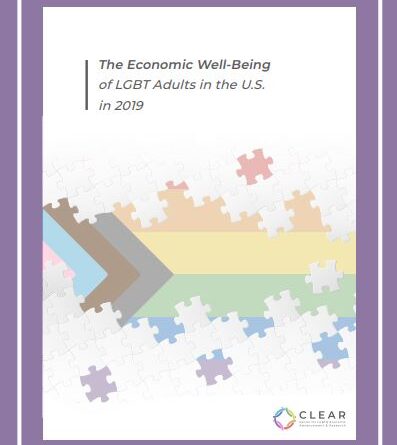The Economic Well-Being of LGBT Adults in the U.S. in 2019
By CLEAR
The Federal Reserve Board has conducted the Survey of Household Economic Decisionmaking (SHED) since 2013. In 2019, the survey included LGBTQ people by asking U.S. adults about their sexual orientation and gender identity (SOGI), enabling for the first time the creation of a picture of the economic well-being of LGBT households using the SHED data.
Analysis of the data shows that in 2019:
• LGBT adults were more often struggling to get by. Fewer than two-thirds of LGBT adults reported they were at least “doing okay” financially (66.1%) in 2019, much less often than non-LGBT adults (77.3%). Black and Hispanic LGBT adults were less likely to report they were doing okay financially. Four in ten Black and Hispanic LGBT adults were “finding it difficult to get by” or “just getting by” (40.6% & 42.7%, respectively).
• LGBT adults were less likely to think economic conditions in the United States were favorable. Only one in three LGBT adults thought conditions in the U.S. were “excellent” or “good” (35.1%), as compared to more than half of non-LGBT adults. LGBT adults were 1.7x more likely to report economic conditions in the U.S. were “poor” (15.5% vs. 9.1%).
• LGBT adults were more likely to report low incomes. One in five LGBT households earned less than $25,000 a year, 1.5x more often than non-LGBT households (21.4% vs. 13.0%). One in four female LGBT adults reported earning less than $25,000 a year (24.6%). More than three in ten Black LGBT households reported earning less than $25,000 a year.
215 views










